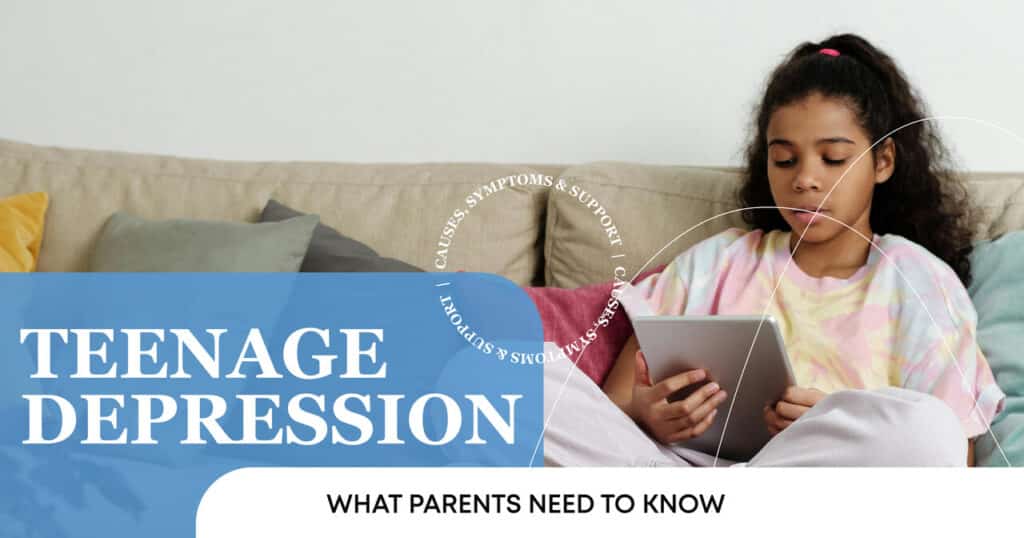Teenage depression is a problem with millions of families around the world. Young teenagers, going through the turmoil, experience problems that result in mental health conditions like depression. First, you should know about them so that you can work on helping them. Let’s see what the causes, symptoms, and steps parents can take to help a teenager deal with depression and anxiety.
Understanding Teenage Depression and Anxiety
What Is Teenage Depression?
Teen depression is not the usual passing blues or mood swings. It is a severe mental illness that affects the way a young teen feels, thinks, and behaves. This may lead to emotional, functional, and physical problems in a teenager’s academic performance, social life, and general well-being.
Causes of Teenage Depression and Anxiety
Biological Factors
Teenage years are often full of hormonal shifts, and the maturation of the brain might make it a pretty variable time to manage mood and emotional response. During this period, the brain’s prefrontal cortex, which includes decision-making and emotion regulation regions, continues to develop.
This makes them vulnerable to emotional upheavals and stress during those times. Besides these causes, genetic factors are also critical. Findings have been seen which indicate that the risks of developing depression in teens are also higher among youngsters. Most of these genetic factors, coupled with environmental factors, strengthen the risk.
Environmental Influences
The main factors affecting teenager’s mental health are external pressures. Even high-achieving teens struggle when the stress of meeting expectations becomes too much to handle.
Another major factor is their relationships with friends. Social situations can lead to feelings of rejection or failure. Additionally, when parents are absent due to divorce, financial issues, or other reasons, it can create emotional turmoil and high levels of stress for teens.
In the digital era, the issues are multifaceted. Social networking platforms create insecurity through impossible achievement, beauty, and happiness standards. Cyberbullying and the perception of an online presence lead to increased anxiety and depression.
Personal Experiences and Trauma
Bullying or even the loss of a parent can be devastating to the mental health of a teenager. And traumatic experiences like adjusting to a new town or a new family can be incredibly traumatic for a teenager as well and cut them from all social stability and security.
Traumatic experiences left unaddressed can create lifelong psychological problems. Scientists have proven that teenagers who have experienced such an event are highly prone to developing PTSD and, in most cases, are diagnosed with depression and anxiety simultaneously.
Recognizing the Signs of Depression
Emotional and Behavioral Symptoms
Adolescents can not verbalize their feelings, so parents, teachers, and guardians must see the behavioral and emotional changes. General manifestations of depression are sad and irritable moods combined with withdrawal from previously liked activities.
Other behaviors suggestive of depression are decreasing grades, withdrawal from enjoyed activities, or use of hopeless words repeatedly. Anxiety in teens usually manifests as an overreaction to everyday situations, restlessness, inability to focus, or fear of doing something wrong.
Physical Symptoms
A depressed teenager’s mental problems often present themselves as physical complaints that sometimes appear to be unrelated medical conditions. Headaches, stomachaches, and pain without reason become recurring patterns with anxiety or depression.
In many cases, sleep disturbances include insomnia or oversleeping. Noticeable changes in appetite could lead to loss or gain of weight. They tend to experience fatigue, for these disorders bring a toll in terms of both mental and emotional stress on a patient.
Differentiating Normal Behavior From Red Flags
The teenage years are a time of many emotional battles, mood swings, or withdrawal, sometimes considered normal as teens are finding their independence. However, the acknowledgment makes all the difference when these times are protracted or severe.
Sad Teenagers who cannot maintain intimate relationships, do not fulfill their responsibilities, talk about their intentions to hurt themselves, or attempt suicide require professional intervention at once.
Open communication among parents and caregivers should ensure that the teen feels safe as they air their feelings, and mental health workers should be consulted when needed.
How Parents Can Support Their Teen
Communication Is Key
A supportive relationship between parents and teens is built on effective communication. Make sure that your teen feels heard and understood. Be empathetic and patient when discussing issues with your teen. Do not dismiss their words or be judgmental. Ask open-ended questions such as, “How are you feeling today? “Or “What’s been on your mind lately?”
You may validate their feelings by supporting them with phrases such as “I can see why you’d feel that way” or “Your feelings are valid.”
If you forget how to do this, simply listening, without always proposing solutions, is the most potent action that shows you care.
Encouraging Healthy Habits
A healthy lifestyle will significantly build your teenager’s mental and emotional resilience. Routine exercise, like walking, doing yoga, or participating in teams, generates endorphins, which tend to decrease a person’s stress and raise their mood.
Nutritional balance can also be encouraged by including numerous fruits and vegetables, whole grains, and lean proteins in their diet, which are essential nutrients that affect brain health and emotional stability.
Another important factor is sleep, a predictable bedtime schedule ensures they get their required 8–10 hours a night. Lead them toward mindfulness practices such as deep breathing or meditation to build resilience against anxiety and stress.
Building a Support Network
A strong, reliable support network can make all the difference for a distressed teen. Build relationships with teachers, school counselors, and coaches that foster the knowledge of the child’s needs and offer advice when needed.
Facilitate healthy friendships and after-school activities where your teenager experiences the same sense of belonging or community. If this level of support is needed, meet with the counselors or therapists working specifically with adolescents.
Get other family members and close friends to give positive reinforcement and encouragement. Another form of support for your teenager is reminding them that seeking help is not a weakness but a strength.
When Professional Help Is Needed
| Solutions | Descriptions |
| Therapy Options for Teen Anxiety and Depression | CBT is the most effective therapy for anxiety symptoms in teens. Family therapy also helps improve communication and relationships. |
The Role of Medication | In some cases, medications may be necessary to treat severe symptoms. A health provider can assist parents in developing a plan. |
| Finding the Right Mental Health Professional | Look for professionals who specialize in adolescent mental health. Ask your pediatrician or school counselor for some recommendations. |
Preventing Anxiety and Depression in Teens
Fostering Resilience
- Teach your teenager to cope, including mindfulness, and deal with stress.
- Resilience will put them in the best position to meet most challenges as they arise.
Creating a Positive Home Environment
- A caring and supportive home reduces the likelihood of anxiety in teenagers.
- Encourage them to open up, set accurate expectations, and celebrate small wins.
Limiting Exposure to Stressors
- Teach your teenager how to manage their time well so they will not be overwhelmed.
- Limit the overuse of social media that causes teenage anxiety and involve them in stress-reducing activities.
The Impact of Social Media on Teenage Mental Health
On the other hand, social media breeds depressed teens because of the unrealistic expectations it creates and the urge to compare oneself with others. Parents can do this by teaching teens good online surfing habits and letting them know that content needs to be consumed.
The Role of Schools in Supporting Mental Health
Schools can do much in identifying cases of mental health disorders. Most schools offer counseling and peer support programs to help teenagers cope with anxiety and depression.
Understanding Gender Differences in Teenage Depression
Research indicates that teenage girls have more anxiety than boys due to hormonal changes and societal pressure. Understanding this difference helps parents provide support to each gender.
Importance of Peer Relationships
A healthy peer relationship is a type of cushion for anxiety and depression. Support your teenager in developing healthy friendships and engage him in group activities.
How Mindfulness and Meditation Help Teens
The techniques of mindlessness and meditation have been shown to minimize symptoms of anxiety in teens. Regular technique practice can improve focus, emotional control, and mental health in general.
Final Thoughts on Teenage Depression Causes, Symptoms & Support
Teen depression is one of the complicated conditions but manageable ones. It is possible to make a positive difference positively in one’s teen’s life if one understands the causes, recognizes signs, and takes proactive steps.
Call to Action:
If you think your teenager is suffering from depression or anxiety, do not wait. Contact a mental health professional today. Early intervention will lead to your teenager’s brighter and healthier future.
FAQs
- What are the common causes of depression in teenagers?
Teenage depression often stems from a combination of factors such as hormonal changes, Emotional changes, social challenges, family conflicts, and personal trauma. The digital age, with social media and cyberbullying, also plays a significant role in increasing depression levels among young teens.
- What are the key signs of depression in teens?
Key signs include excessive worrying, irritability, avoidance, physical symptoms, difficulty concentrating, frequent physical complaints like headaches or stomachaches, and sleep disturbances. Recognizing these symptoms early is crucial for timely intervention.
- How can parents help their teens manage depression?
Parents can help by promoting open communication, encouraging healthy habits like regular exercise and balanced nutrition, and building a reliable support network. If symptoms persist, seeking professional help, such as therapy or counseling, is essential.
- What therapy options are effective for teen depression?
Cognitive Behavioral Therapy (CBT) is one of the most effective therapies for managing teen depression. Family therapy can also improve communication and relationships, while mindfulness practices help teens develop coping skills.
- How does social media impact teenage depression?
Social media can contribute to depression by promoting unrealistic expectations and promoting unhealthy comparisons. Excessive use may also lead to feelings of inadequacy and isolation. Parents can mitigate this by setting boundaries and encouraging mindful use of social media platforms.





